holistic gastrointestinal lymphoma support
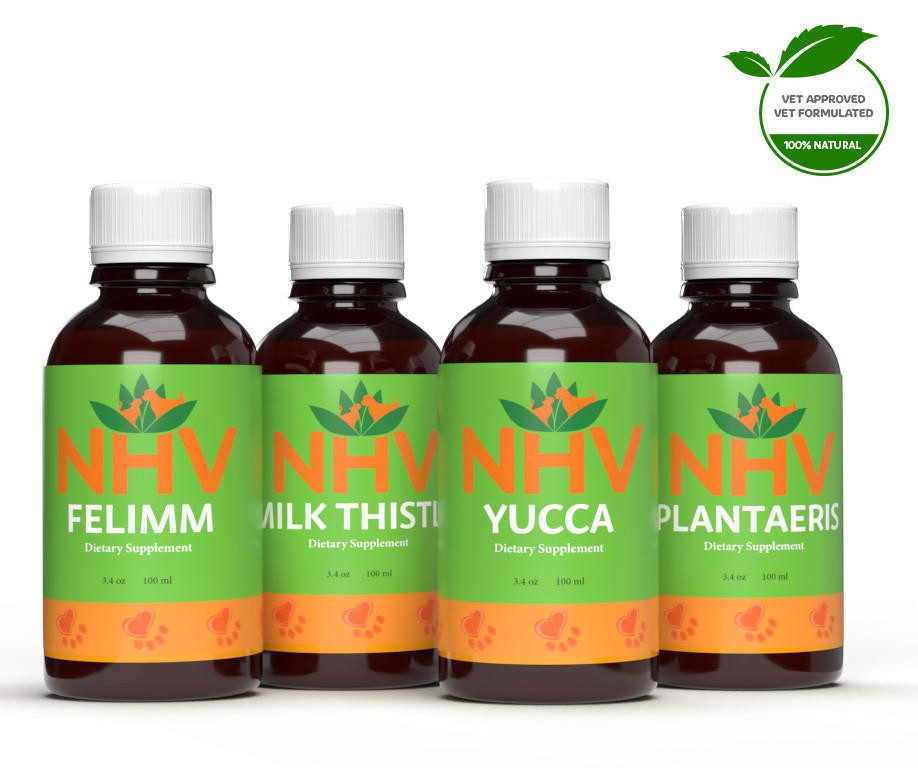
free shipping over $100 (USA & Canada)
1-877-937-4372 the pet expert hotline
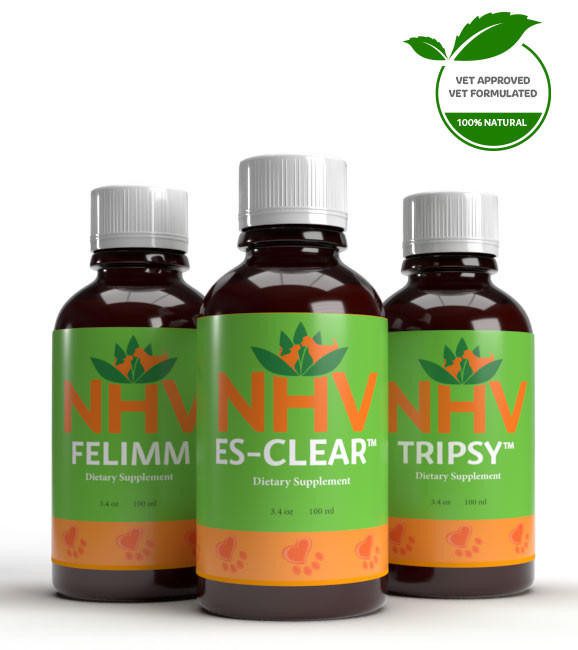

Lymphoma in dogs and cats is one of the most commonly diagnosed conditions. While hearing a vet utter the word “lymphoma” can cause a rollercoaster of emotions, it’s important that we, as pet parents do everything we can to help our pets live a full and comfortable life despite their diagnosis. Educating ourselves on the different types of lymphoma and what we can do to support it is a great place to start!
Lymphoma is a blanket term to describe a group of cancers that come from lymphocytes, which is a type of white blood cell that works with the immune system to fight off infections. Lymphoma in cats and dogs is most similar to Non-Hodgkin’s lymphoma in humans and uses almost the same treatment protocol.
While lymphoma can affect both cats and dogs, there are different types of lymphoma that can affect each species.
Unfortunately, the exact cause of lymphoma is not yet known. Possible causes can include viruses, bacteria, and chemical exposure.
Lymphoma is a blanket term to describe a group of cancers that come from lymphocytes that work with the immune system to fight off infections.
There are over 30 types of canine lymphomas which vary in aggressiveness and symptoms. The four most common types of lymphoma are:
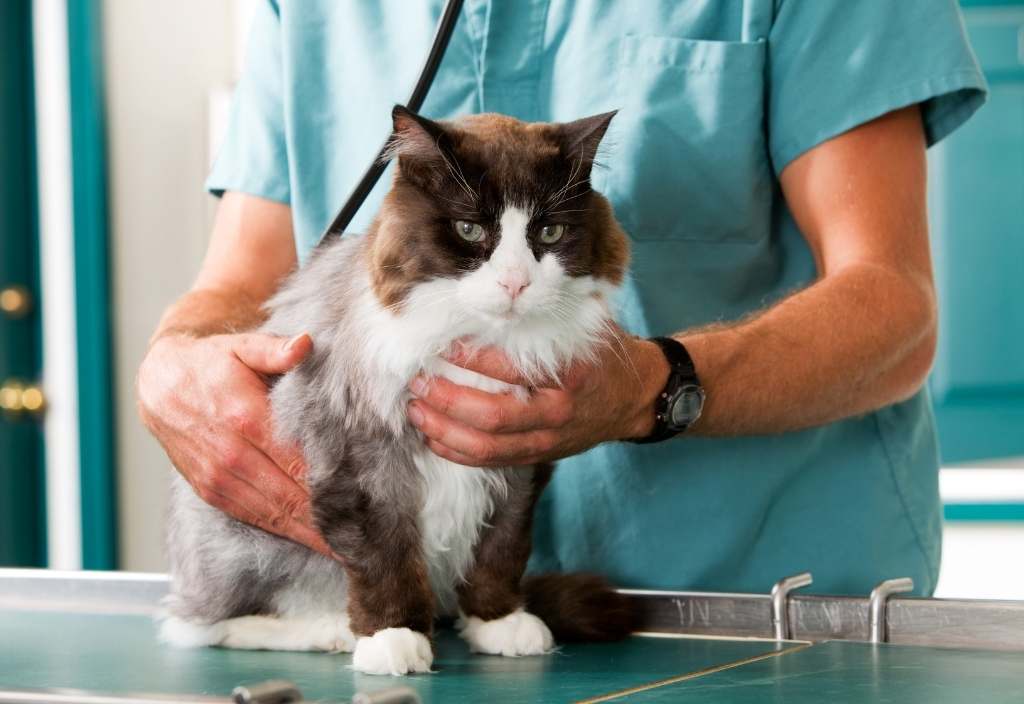
Lymphoma in cats is often connected with feline leukemia (FeLV) and FIV. With that, measures to reduce the risk of these viral infections, like vaccination, can also help prevent this type of cancer. With the higher immunization rate for feline leukemia, lymphoma in cats tends to become less common. In the meantime, it’s still seen frequently, accounting for 30% of feline cancer diagnoses.
The three most common sites of lymphoma in cats include gastrointestinal lymphoma, mediastinal lymphoma, and renal lymphoma.
A proper diet can also play a huge role in managing the overall health and wellness of a pet with lymphoma!
Most vets will start with blood testing when first exploring the possibility of lymphoma. A fine needle aspirate is also commonly used in diagnosing this type of cancer. A needle is inserted into an enlarged lymph node or organ and is examined under a microscope.
Chemotherapy is usually the treatment prescribed by veterinarians. The type of treatment will also depend on which type of lymphoma your little one has, and the vet may also suggest radiation or surgery.
A proper diet can also play a huge role in managing the overall health and wellness of a pet with lymphoma!
There’s no arguing that conditions like lymphoma can be tough on our precious pets’ bodies. Giving our sweethearts the extra support they need while they undergo traditional vet-prescribed treatments can help to ensure they feel as comfortable and as happy as possible!
For most cases of lymphoma in dogs and cats, we recommend our Lymphoma Gold Support Kit. This bundle contains three supplements that can help improve energy levels, address symptoms associated to the disease, and promote overall quality of life. The kit includes NHV ES-Clear, which as our main cancer-support herbal blend, encourages natural detoxification of the body. NHV Felimm helps support both the immune and lymphatic systems. Lastly, NHV Tripsy can help to maintain the kidneys and urinary tract.
For cases of alimentary lymphoma, our Gastrointestinal Lymphoma Support Kit can be helpful. This bundle contains NHV Felimm, NHV Milk Thistle, NHV Yucca, and NHV Plantaeris. When these all-natural supplements are used together, they can help to balance the immune system, promote liver health, reduce discomfort, stimulate appetite, maintain gastrointestinal health, and encourage healthy bowel movements.
NHV Natures Immuno is also among our top recommendations for pets with lymphoma. This mushroom blend includes ingredients well-known for their extensive health benefits and can help the body’s ability to produce white blood cells. It’s also beneficial as anti-cancer, anti-tumor, cardiovascular, liver, kidney, diabetic, and endocrine health, which all help to encourage overall well-being.
NHV PetOmega 3 contains eicosapentaenoic acid (EPA) and docosahexaenoic acid (DHA), which have also proven helpful in supporting dogs and cats with lymphoma. PetOmega 3 can also help to prevent weight loss, decrease inflammation, and can inhibit metastasis.
FYI: All of our supplements are safe to be taken alongside vet-prescribed medications (including chemotherapy) as additional support. We only ask that a 30-minute to 2-hour window between our supplements and traditional medications is respected so as to not overwhelm your furkiddo.
If your pet has been diagnosed with lymphoma, please know that you’re never alone. Our team of vets and pet experts is always here to help support and guide you whenever you need it. Click the button below to reach out to us. We will gladly work alongside your vet oncologist to recommend a personalized regimen to your little one.
holistic gastrointestinal lymphoma support

Felimm, Milk Thistle, Yucca & Plantaeris
bundle and save with pet expert kits
3 month supply for a small to medium size pet
This vet-formulated kit helps give extra support to your furkiddo while they fight against gastrointestinal lymphoma. These pet supplements help detoxify the lymphatic system, stimulate the appetite, protect organs from the side effects of chemotherapy, aid in reducing inflammation, discomfort and help normalize bowel movements— all very common issues faced by pets affected by this condition.


This vet-formulated kit helps give extra support to your furkiddo while they fight against gastrointestinal lymphoma. These pet supplements help detoxify the lymphatic system, stimulate the appetite, protect organs from the side effects of chemotherapy, aid in reducing inflammation, discomfort and help normalize bowel movements— all very common issues faced by pets affected by this condition.

Gastrointestinal lymphoma, also known as alimentary lymphoma, is one of the most common kinds of lymphoma in cats especially. It is characterized by the presence of a solitary mass, multiple masses with or without regional intra-abdominal lymph node involvement, or as a diffusely infiltrating disease of one or more parts of the bowel. The cause is not well understood, but factors like genetics, FeLV and environmental factors such as exposure to cigarette smoke can play an important role.
As the alimentary form can affect any part of the stomach or intestines, it often causes symptoms like weight loss, lethargy, loss of appetite, vomiting, and diarrhea. An abdominal mass can also develop and might be felt on a physical examination. Some pets may experience enlargement of organs like liver and spleen as well.
A powerful complete kit
The herbs these formulations have anti-inflammatory, antioxidant and nutritive properties that will help provide support with the symptoms of gastrointestinal lymphoma, detoxify the lymphatic system, stimulate the appetite, balance the immune system and ease the discomfort, lethargy, inflammation and discomfort caused by it.
Felimm
Milk Thistle
Yucca
Plantaeris
Gastrointestinal Support kit is vet formulated with all-natural products and contains four powerful supplements: NHV’s Felimm, NHV’s Milk Thistle, NHV’s Yucca and NHV’s Plantaeris, which are combined to help relieve symptoms of gastrointestinal lymphoma and balance your pet’s immune system.
If you have questions about holistic remedies, you can ask an expert at NHV because we want your pet to get healthy naturally.
Felimm: This formula helps to balance the immune system that is dysregulated in a pet with Lymphoma. It also helps fight against Feline Leukemia (FeLV) that may be related to Lymphoma and other viral infections. In addition, it helps fight infections, encourages detoxication of the lymphatic system, stimulates the appetite, improves energy levels, and helps combat upper respiratory tract infections.
St. John’s Wort— Has powerful antiviral properties that help control viral infections and stimulates your pet’s immune system.
Turmeric – A powerful antioxidant that helps fight the damaging effects of free radicals. It strengthens liver function and contains strong anti-fungal properties.
Aloe Vera – Anti-inflammatory, antibacterial, antioxidant and immuno-stimulating herb.
Alfalfa – Contains high levels of antioxidants. It also contains nutrients beneficial to pets with immune disorders.
Burdock – Helps cleanse the body of toxins and waste that accumulate during illness.
Cat’s Claw – A powerful anti-inflammatory and antioxidant that supports your pet’s immune system and helps strengthen its defenses against viruses like FeLV.
Osha – A natural immune builder that helps pets fight infections including FeLV and FIV. It also has antibacterial and antiviral properties.
Dandelion – A highly nutritious food that improves digestion and stimulates appetite. It also protects the kidneys and has anti-inflammatory properties.
Gotu Kola– An antioxidant-rich herb known to strengthen the immune system and protect cells from damage caused by free radicals.
Usnea – An immune system stimulant with anti-bacterial and anti-fungal properties that help protect your pet’s weakened immune system.
Goldenseal – An immune supporting herb with blood cleansing properties.
Myrrh – Helps control bacterial infections that pets with compromised immune systems are so vulnerable to
Milk Thistle: Chemotherapy has many side effects, such as toxicity of the organs, unfortunately. Milk Thistle can help prevent and decrease these toxicities since it can detoxify liver and kidneys by removing toxins that can build up in a pet`s system when taking pharmaceutical or chemical-laden foods. Improves liver and kidney function supports regeneration of the liver and supports overworked kidney. It also has antioxidant properties and may benefit as anticancer support. Milk Thistle contains a compound called silymarin which flavonoids contains strong anti-inflammatory, antioxidant and detoxifying properties. It also promotes cellular regeneration and repair.
Yucca: As corticosteroids are often used in the treatment of lymphoma and Yucca contain steroidal saponins, it can be very useful for pets suffering from Alimentary Lymphoma. This is well researched and reported that these steroidal saponins present in Yucca stimulate the body to produce its own natural corticosteroids. Our Yucca is formulated and dosed specifically to be safe for long term use in pets. It has been used successfully. Commonly used as an anti-inflammatory, nutritive, antitumor, and digestive supplement.
Plantaeris: It helps maintain normal bowel functions, soothes and relieves spasms of the digestive tract and reduces discomfort of pets suffering from Gastrointestinal Lymphoma.
Barberry – Treats inflammation and infections.
Mullein – Soothes and lubricates tissues of the GI tract.
Bayberry – Contains tannins, resins, and gums that control bacterial infection.
Myrrh – Relieves spasms, inflammation, and digestive discomfort.
Thyme – Improves digestion and relaxes GI spasms.
Chamomile – Relaxes the digestive system.
Chinese Peony – Reduces inflammation and relaxes spasms.
Ginger – Relieves discomfort and stimulates circulation.
Oregon Grape – Helps relieve indigestion and malabsorption.
Select your pet's weight to determine the correct dose.
DOSAGE:
To be taken twice daily. All NHV supplements are designed to be used together, and can therefore be given at once for convenience.
Maintenance Dosage
1 drop for every 2 lb of body weight twice a day up to 50 lb. This is the minimum dosage. We recommend using this dosage when the supplements are being used as proactive care or for general health. When addressing a condition, we recommend using the therapeutic dosage (see below).
Determine your pet’s weight and then use the chart below to determine the correct dose.
Pet's Weight Dosage (twice daily)
0 - 15 lb 0.5 mL
16 - 30 lb 1.0 mL
31 - 45 lb 1.5 mL
46 - 60 lb 2.0 mL
61 - 75 lb 2.5 mL
Over 75 lb 3.0 mL
How to Administer
Shake well before use. The easiest method is to use the dropper provided and squirt directly into the pet’s mouth or add the correct dosage to your pet's food or favorite treat.
Some pets can be finicky, if this occurs consider hiding the drops in foods most pet’s love such as fish, chicken or yogurt or a favorite treat. If your pet only eats dry food then soak a few kibbles at feeding time.
For Best Results
Herbal dietary supplements are beneficial to the health and wellbeing of your pet and are safe for long-term use. Every pet responds to natural herbal supplements differently, therefore it is important to be consistent and administer the product daily. Supplements generally take two to four weeks to take effect, however this will vary from one animal to the another.
Product Storage
All NHV Natural Pet Products are pure herbal extracts and contain no added artificial additives, preservatives or coloring. Shelf life after opening is 6 months and must be refrigerated after opening
Gastrointestinal lymphoma, also known as alimentary lymphoma, is one of the most common kinds of lymphoma in cats especially. It is characterized by the presence of a solitary mass, multiple masses with or without regional intra-abdominal lymph node involvement, or as a diffusely infiltrating disease of one or more parts of the bowel. The cause is not well understood, but factors like genetics, FeLV and environmental factors such as exposure to cigarette smoke can play an important role.
As the alimentary form can affect any part of the stomach or intestines, it often causes symptoms like weight loss, lethargy, loss of appetite, vomiting, and diarrhea. An abdominal mass can also develop and might be felt on a physical examination. Some pets may experience enlargement of organs like liver and spleen as well.
A powerful complete kit
The herbs these formulations have anti-inflammatory, antioxidant and nutritive properties that will help provide support with the symptoms of gastrointestinal lymphoma, detoxify the lymphatic system, stimulate the appetite, balance the immune system and ease the discomfort, lethargy, inflammation and discomfort caused by it.
Felimm
Milk Thistle
Yucca
Plantaeris
Gastrointestinal Support kit is vet formulated with all-natural products and contains four powerful supplements: NHV’s Felimm, NHV’s Milk Thistle, NHV’s Yucca and NHV’s Plantaeris, which are combined to help relieve symptoms of gastrointestinal lymphoma and balance your pet’s immune system.
If you have questions about holistic remedies, you can ask an expert at NHV because we want your pet to get healthy naturally.
Felimm: This formula helps to balance the immune system that is dysregulated in a pet with Lymphoma. It also helps fight against Feline Leukemia (FeLV) that may be related to Lymphoma and other viral infections. In addition, it helps fight infections, encourages detoxication of the lymphatic system, stimulates the appetite, improves energy levels, and helps combat upper respiratory tract infections.
St. John’s Wort— Has powerful antiviral properties that help control viral infections and stimulates your pet’s immune system.
Turmeric – A powerful antioxidant that helps fight the damaging effects of free radicals. It strengthens liver function and contains strong anti-fungal properties.
Aloe Vera – Anti-inflammatory, antibacterial, antioxidant and immuno-stimulating herb.
Alfalfa – Contains high levels of antioxidants. It also contains nutrients beneficial to pets with immune disorders.
Burdock – Helps cleanse the body of toxins and waste that accumulate during illness.
Cat’s Claw – A powerful anti-inflammatory and antioxidant that supports your pet’s immune system and helps strengthen its defenses against viruses like FeLV.
Osha – A natural immune builder that helps pets fight infections including FeLV and FIV. It also has antibacterial and antiviral properties.
Dandelion – A highly nutritious food that improves digestion and stimulates appetite. It also protects the kidneys and has anti-inflammatory properties.
Gotu Kola– An antioxidant-rich herb known to strengthen the immune system and protect cells from damage caused by free radicals.
Usnea – An immune system stimulant with anti-bacterial and anti-fungal properties that help protect your pet’s weakened immune system.
Goldenseal – An immune supporting herb with blood cleansing properties.
Myrrh – Helps control bacterial infections that pets with compromised immune systems are so vulnerable to
Milk Thistle: Chemotherapy has many side effects, such as toxicity of the organs, unfortunately. Milk Thistle can help prevent and decrease these toxicities since it can detoxify liver and kidneys by removing toxins that can build up in a pet`s system when taking pharmaceutical or chemical-laden foods. Improves liver and kidney function supports regeneration of the liver and supports overworked kidney. It also has antioxidant properties and may benefit as anticancer support. Milk Thistle contains a compound called silymarin which flavonoids contains strong anti-inflammatory, antioxidant and detoxifying properties. It also promotes cellular regeneration and repair.
Yucca: As corticosteroids are often used in the treatment of lymphoma and Yucca contain steroidal saponins, it can be very useful for pets suffering from Alimentary Lymphoma. This is well researched and reported that these steroidal saponins present in Yucca stimulate the body to produce its own natural corticosteroids. Our Yucca is formulated and dosed specifically to be safe for long term use in pets. It has been used successfully. Commonly used as an anti-inflammatory, nutritive, antitumor, and digestive supplement.
Plantaeris: It helps maintain normal bowel functions, soothes and relieves spasms of the digestive tract and reduces discomfort of pets suffering from Gastrointestinal Lymphoma.
Barberry – Treats inflammation and infections.
Mullein – Soothes and lubricates tissues of the GI tract.
Bayberry – Contains tannins, resins, and gums that control bacterial infection.
Myrrh – Relieves spasms, inflammation, and digestive discomfort.
Thyme – Improves digestion and relaxes GI spasms.
Chamomile – Relaxes the digestive system.
Chinese Peony – Reduces inflammation and relaxes spasms.
Ginger – Relieves discomfort and stimulates circulation.
Oregon Grape – Helps relieve indigestion and malabsorption.
Select your pet's weight to determine the correct dose.
DOSAGE:
To be taken twice daily. All NHV supplements are designed to be used together, and can therefore be given at once for convenience.
Maintenance Dosage
1 drop for every 2 lb of body weight twice a day up to 50 lb. This is the minimum dosage. We recommend using this dosage when the supplements are being used as proactive care or for general health. When addressing a condition, we recommend using the therapeutic dosage (see below).
Determine your pet’s weight and then use the chart below to determine the correct dose.
Pet's Weight Dosage (twice daily)
0 - 15 lb 0.5 mL
16 - 30 lb 1.0 mL
31 - 45 lb 1.5 mL
46 - 60 lb 2.0 mL
61 - 75 lb 2.5 mL
Over 75 lb 3.0 mL
How to Administer
Shake well before use. The easiest method is to use the dropper provided and squirt directly into the pet’s mouth or add the correct dosage to your pet's food or favorite treat.
Some pets can be finicky, if this occurs consider hiding the drops in foods most pet’s love such as fish, chicken or yogurt or a favorite treat. If your pet only eats dry food then soak a few kibbles at feeding time.
For Best Results
Herbal dietary supplements are beneficial to the health and wellbeing of your pet and are safe for long-term use. Every pet responds to natural herbal supplements differently, therefore it is important to be consistent and administer the product daily. Supplements generally take two to four weeks to take effect, however this will vary from one animal to the another.
Product Storage
All NHV Natural Pet Products are pure herbal extracts and contain no added artificial additives, preservatives or coloring. Shelf life after opening is 6 months and must be refrigerated after opening
medicinal mushroom blend
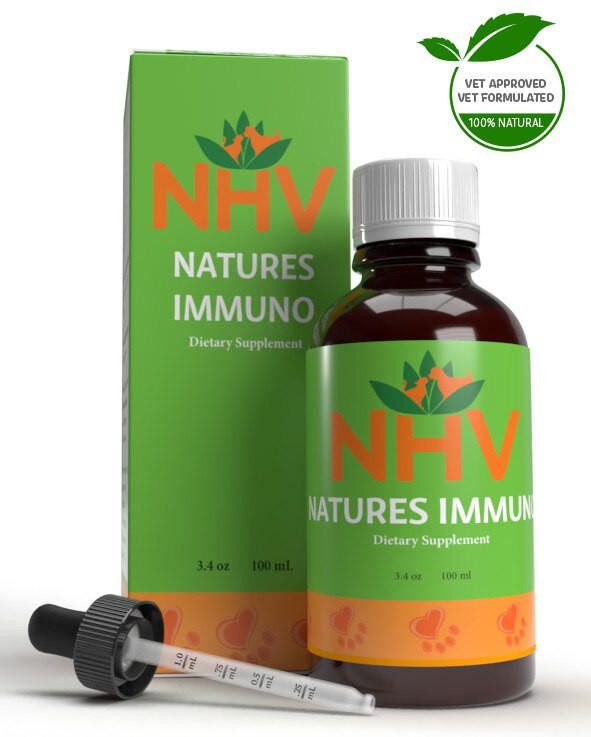
Blend of medicinal mushrooms (turkey tails, cordyceps, reishi, shiitake, agaricus)
buy 2 and save $3
3 month supply for a small to medium size pet

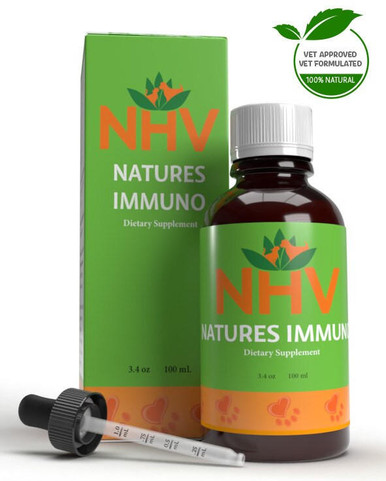

Medicinal mushroom blends are used by holistic and conventional veterinarians to help cats suffering from a variety of health conditions. Their immune supporting effects help with feline cancer, chronic feline infections, liver disorders, compromised immune systems, endocrine disorders, and kidney, respiratory, and cardiovascular problems.
Medicinal mushrooms are currently being researched and studied for their vast array of health benefits. NHV uses these mushrooms as a primary ingredient in supplements that support the immune system of cats.
The healing power of medicinal mushrooms has been known throughout Asia for thousands of years. The pharmacological potential of medicinal mushrooms is being extensively studied around the globe. Research is finding that specific medicinal mushrooms, like Turkey Tail mushrooms, may have the potential to help treat cancer, balance the immune system, and aid with digestive problems.
“The mounting evidence from various research groups across the globe, regarding anti-tumor application of mushroom extracts unarguably make it a fast-track research area worth mass attention.” – (Patel and Goyal, 2012)
The five well-researched mushrooms contained in our vet-formulated cat immune support supplement blend include:
Because this blend is in liquid form, it helps increase the bioavailability of the mushrooms, so your cat absorbs the medicine at a faster rate.
Use NHV’s holistic immune cancer support for cats with treatment prescribed by your vet for comprehensive care. You can always ask the experts at NHV where our pet experts are here to help answer questions, offer guidance and give support along the way.
Read more about cat immune support using the miracles of medicinal mushrooms on our blog because, at NHV, we care about your cat’s health naturally.
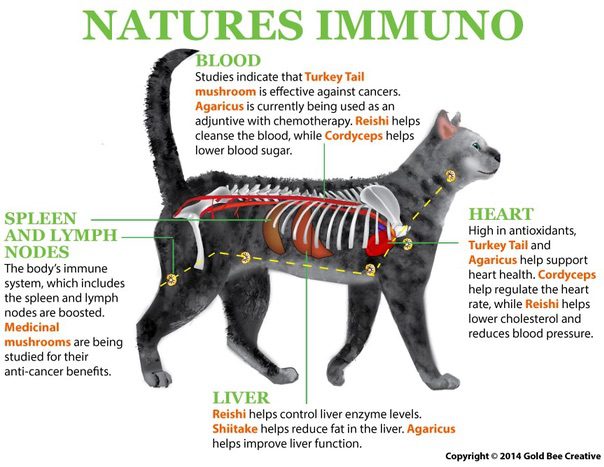
Turkey Tail mushroom has traditionally been used in Native American herbalism and in Chinese medicine to help improve immune function. It is a mushroom that has undergone a considerable resurgence in modern research for its health benefits. Studies have shown that it is beneficial for a wide variety of cancers, including mammary gland cancer and lymphoma. Researchers believe that Turkey Tail mushrooms contain properties that fight cancer while also helping to strengthen the immune system. It has antioxidant, anticarcinogenic, immune-modulating, anti-inflammatory, and cardioprotective properties.
Cordyceps mushroom is rich in phytonutrients and contains polysaccharides, which help with antioxidant properties. Research has indicated that cordyceps have anti-tumor, immune stimulating and hypoglycemic activity. They are beneficial for diabetes as they help lower blood sugar. Cordyceps are also beneficial for heart health, liver and kidney health.
Reishi mushroom has been used for thousands of years in traditional Chinese Medicine. Current research indicates that reishi mushrooms are helpful in supporting the immune and cardiovascular systems, as well as helping to increase oxygenation of the blood. Reishi is effective against sarcoma and tumor necrosis. Reishi is currently being used in Japan and China in conjunction with chemotherapy drugs.
Shiitake mushroom has been used for thousands of years in herbalism, and is also a popular cooking ingredient. Research indicates that Shiitake has strong antibiotic and antibacterial properties against a broad spectrum of pathogens. In addition to its potential cancer-fighting properties, it is useful in supporting heart health as it lowers cholesterol and helps lessen plaque in the arteries.
Agaricus mushroom is studied for their usefulness in preventing cancer cell production. Agaricus is considered an antimutagenic and an adaptogen, which helps combat stress and supports endocrine function. It is useful for pets with autoimmune conditions, digestive issues, and heart problems. Agaricus is being used in Japan as an adjunctive with chemotherapy treatments.
Select your pet's weight to determine the correct dose.
To be taken twice daily.
Determine your pet’s weight and then use the easy chart below to determine the correct dose. You can safely double the recommended dosage.
Pet's Weight Dosage
0 - 15 lb 0.5 mL
16 - 30 lb 1.0 mL
31 - 45 lb 1.5 mL
46 - 60 lb 2.0 mL
61 - 75 lb 2.5 mL
Over 75 lb 3.0 mL
How to Administer
Shake well before use. The easiest method is to use the dropper provided and place the drops into your pet’s food or favorite treat. You can also use the dropper and squirt directly into the pet’s mouth. Some pets can be finicky, if this occurs consider hiding the drops in foods most pet’s love such as fish, chicken, yogurt, or a favorite treat. If your pet only eats dry food then soak a few kibbles at feeding time.
For Best Results
Herbal dietary supplements are beneficial to the health and well-being of your pet and are safe for long-term use. Every pet responds to natural herbal supplements differently, therefore it is important to be consistent and administer the product daily. Supplements generally take two to four weeks to take effect, however this will vary from one animal to the next.
Product Storage
All NHV Natural Pet Products are pure herbal extracts and contain no artificial additives, preservatives or coloring. Shelf life after opening is 6 months and must be refrigerated after opening.
Medicinal mushroom blends are used by holistic and conventional veterinarians to help cats suffering from a variety of health conditions. Their immune supporting effects help with feline cancer, chronic feline infections, liver disorders, compromised immune systems, endocrine disorders, and kidney, respiratory, and cardiovascular problems.
Medicinal mushrooms are currently being researched and studied for their vast array of health benefits. NHV uses these mushrooms as a primary ingredient in supplements that support the immune system of cats.
The healing power of medicinal mushrooms has been known throughout Asia for thousands of years. The pharmacological potential of medicinal mushrooms is being extensively studied around the globe. Research is finding that specific medicinal mushrooms, like Turkey Tail mushrooms, may have the potential to help treat cancer, balance the immune system, and aid with digestive problems.
“The mounting evidence from various research groups across the globe, regarding anti-tumor application of mushroom extracts unarguably make it a fast-track research area worth mass attention.” – (Patel and Goyal, 2012)
The five well-researched mushrooms contained in our vet-formulated cat immune support supplement blend include:
Because this blend is in liquid form, it helps increase the bioavailability of the mushrooms, so your cat absorbs the medicine at a faster rate.
Use NHV’s holistic immune cancer support for cats with treatment prescribed by your vet for comprehensive care. You can always ask the experts at NHV where our pet experts are here to help answer questions, offer guidance and give support along the way.
Read more about cat immune support using the miracles of medicinal mushrooms on our blog because, at NHV, we care about your cat’s health naturally.

Turkey Tail mushroom has traditionally been used in Native American herbalism and in Chinese medicine to help improve immune function. It is a mushroom that has undergone a considerable resurgence in modern research for its health benefits. Studies have shown that it is beneficial for a wide variety of cancers, including mammary gland cancer and lymphoma. Researchers believe that Turkey Tail mushrooms contain properties that fight cancer while also helping to strengthen the immune system. It has antioxidant, anticarcinogenic, immune-modulating, anti-inflammatory, and cardioprotective properties.
Cordyceps mushroom is rich in phytonutrients and contains polysaccharides, which help with antioxidant properties. Research has indicated that cordyceps have anti-tumor, immune stimulating and hypoglycemic activity. They are beneficial for diabetes as they help lower blood sugar. Cordyceps are also beneficial for heart health, liver and kidney health.
Reishi mushroom has been used for thousands of years in traditional Chinese Medicine. Current research indicates that reishi mushrooms are helpful in supporting the immune and cardiovascular systems, as well as helping to increase oxygenation of the blood. Reishi is effective against sarcoma and tumor necrosis. Reishi is currently being used in Japan and China in conjunction with chemotherapy drugs.
Shiitake mushroom has been used for thousands of years in herbalism, and is also a popular cooking ingredient. Research indicates that Shiitake has strong antibiotic and antibacterial properties against a broad spectrum of pathogens. In addition to its potential cancer-fighting properties, it is useful in supporting heart health as it lowers cholesterol and helps lessen plaque in the arteries.
Agaricus mushroom is studied for their usefulness in preventing cancer cell production. Agaricus is considered an antimutagenic and an adaptogen, which helps combat stress and supports endocrine function. It is useful for pets with autoimmune conditions, digestive issues, and heart problems. Agaricus is being used in Japan as an adjunctive with chemotherapy treatments.
Select your pet's weight to determine the correct dose.
To be taken twice daily.
Determine your pet’s weight and then use the easy chart below to determine the correct dose. You can safely double the recommended dosage.
Pet's Weight Dosage
0 - 15 lb 0.5 mL
16 - 30 lb 1.0 mL
31 - 45 lb 1.5 mL
46 - 60 lb 2.0 mL
61 - 75 lb 2.5 mL
Over 75 lb 3.0 mL
How to Administer
Shake well before use. The easiest method is to use the dropper provided and place the drops into your pet’s food or favorite treat. You can also use the dropper and squirt directly into the pet’s mouth. Some pets can be finicky, if this occurs consider hiding the drops in foods most pet’s love such as fish, chicken, yogurt, or a favorite treat. If your pet only eats dry food then soak a few kibbles at feeding time.
For Best Results
Herbal dietary supplements are beneficial to the health and well-being of your pet and are safe for long-term use. Every pet responds to natural herbal supplements differently, therefore it is important to be consistent and administer the product daily. Supplements generally take two to four weeks to take effect, however this will vary from one animal to the next.
Product Storage
All NHV Natural Pet Products are pure herbal extracts and contain no artificial additives, preservatives or coloring. Shelf life after opening is 6 months and must be refrigerated after opening.
overall vitality

For Overall Health and Well-Being
buy 2 and save $3
Support your dog’s health with omega 3 fish oil for dogs. Help them maintain a healthy coat, eyes, joints, immune system and overall organ function.


Support your dog’s health with omega 3 fish oil for dogs. Help them maintain a healthy coat, eyes, joints, immune system and overall organ function.

Our omega 3 fish oil for dogs is a great source of EPA (Eicosapentaenoic Acid 600mg) and DHA (Docosahexaenoic acid 460mg) essential fatty acids. This fish oil supplement for dogs is derived from sardines, anchovies and North Atlantic cod liver oil. It is molecularly distilled and cold pressed to improve the bioavailability of the omega 3 fatty acids, and is medical and human grade quality.
Omega 3 fish oil for dogs may be beneficial for the following:
Processed pet foods have increased omega-6 fatty acids, and decreased omega-3 fatty acids. The University of Maryland Medical Center states, "It is very important to maintain a balance between omega-3 and omega-6 fatty acids in the diet. A proper balance helps maintain and even improve health." Your dog’s body cannot easily make essential fatty acids. It is vital to provide omega 3 fish oil for dogs as an added supplement to your pet’s daily diet.
The American Journal of Veterinary Medicine has published studies on the benefits of omega 3 fatty acids (fish oils) for arthritis and degenerative joint disease in dogs. The studies showed that dogs who were given omega 3 fatty acids had a significantly improved ability to get up from a resting position and marked improvement in walking ability.

Suggested Dosage: To be taken once per day. Add to food based on weight chart.
Therapeutic Dosage: Double the quantity for maximum period of 4 weeks or follow veterinarian advise.
Pet’s Weight Dosage
0-15 lb = ¼ tsp
15-30 lb = ½ tsp
30-60 lb = 1 tsp
60-90 lb = 1 ½ tsp
How to Administer: Shake well before use. The easiest method is to add the dosage to your pets food. Some pets can be finicky, if this occurs consider hiding the appropriate amount in food most pet’s love such as fish, chicken, yogurt, or a favorite treat. If your pet only eats dry food then soak kibbles at feeding time.
For Best Results
Dietary supplements are beneficial to the health and well-being of your pet and are safe for long-term use. Every pet responds to natural supplements differently, therefore it is important to be consistent and administer the product daily. Supplements generally take two to four weeks to take effect, however this will vary from one animal to the next.
Product Storage
All NHV Natural Pet Products contain no artificial additives, preservatives or coloring. Shelf life after opening is 6 months and must be refrigerated after opening.
Cautions and Contraindications
Avoid During Pregnancy.
Our omega 3 fish oil for dogs is a great source of EPA (Eicosapentaenoic Acid 600mg) and DHA (Docosahexaenoic acid 460mg) essential fatty acids. This fish oil supplement for dogs is derived from sardines, anchovies and North Atlantic cod liver oil. It is molecularly distilled and cold pressed to improve the bioavailability of the omega 3 fatty acids, and is medical and human grade quality.
Omega 3 fish oil for dogs may be beneficial for the following:
Processed pet foods have increased omega-6 fatty acids, and decreased omega-3 fatty acids. The University of Maryland Medical Center states, "It is very important to maintain a balance between omega-3 and omega-6 fatty acids in the diet. A proper balance helps maintain and even improve health." Your dog’s body cannot easily make essential fatty acids. It is vital to provide omega 3 fish oil for dogs as an added supplement to your pet’s daily diet.
The American Journal of Veterinary Medicine has published studies on the benefits of omega 3 fatty acids (fish oils) for arthritis and degenerative joint disease in dogs. The studies showed that dogs who were given omega 3 fatty acids had a significantly improved ability to get up from a resting position and marked improvement in walking ability.

Suggested Dosage: To be taken once per day. Add to food based on weight chart.
Therapeutic Dosage: Double the quantity for maximum period of 4 weeks or follow veterinarian advise.
Pet’s Weight Dosage
0-15 lb = ¼ tsp
15-30 lb = ½ tsp
30-60 lb = 1 tsp
60-90 lb = 1 ½ tsp
How to Administer: Shake well before use. The easiest method is to add the dosage to your pets food. Some pets can be finicky, if this occurs consider hiding the appropriate amount in food most pet’s love such as fish, chicken, yogurt, or a favorite treat. If your pet only eats dry food then soak kibbles at feeding time.
For Best Results
Dietary supplements are beneficial to the health and well-being of your pet and are safe for long-term use. Every pet responds to natural supplements differently, therefore it is important to be consistent and administer the product daily. Supplements generally take two to four weeks to take effect, however this will vary from one animal to the next.
Product Storage
All NHV Natural Pet Products contain no artificial additives, preservatives or coloring. Shelf life after opening is 6 months and must be refrigerated after opening.
Cautions and Contraindications
Avoid During Pregnancy.
Published: November 3, 2022